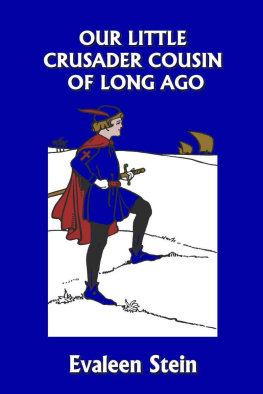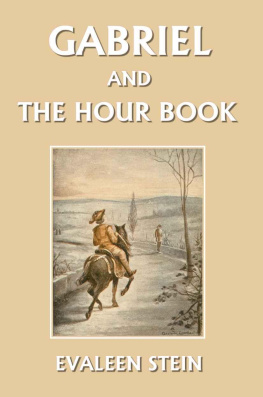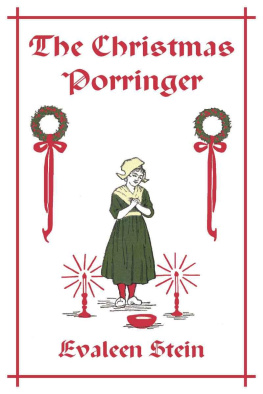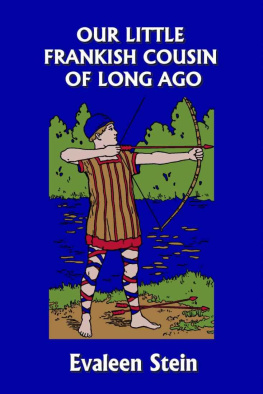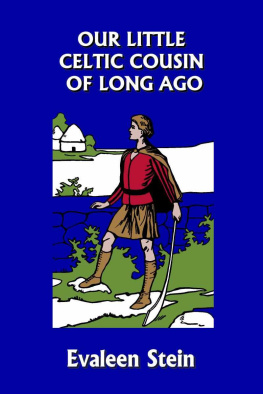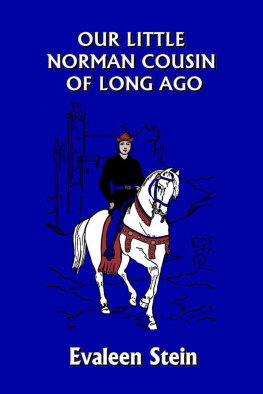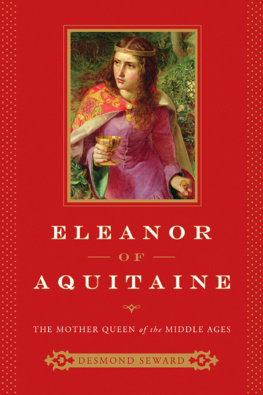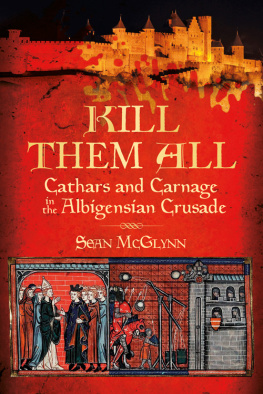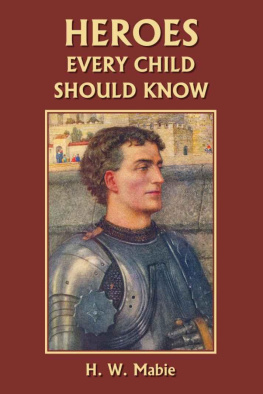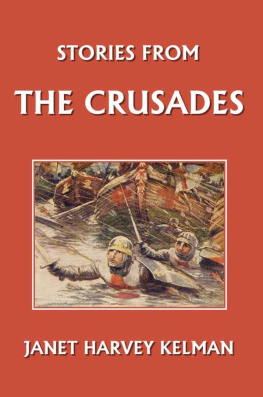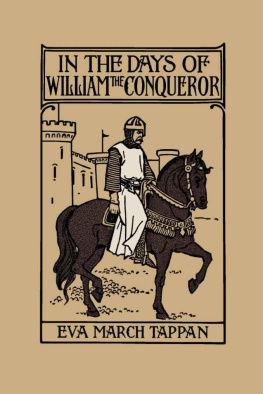Evaleen Stein - Our Little Crusader Cousin of Long Ago
Here you can read online Evaleen Stein - Our Little Crusader Cousin of Long Ago full text of the book (entire story) in english for free. Download pdf and epub, get meaning, cover and reviews about this ebook. year: 2007, publisher: Yesterdays Classics, genre: Art. Description of the work, (preface) as well as reviews are available. Best literature library LitArk.com created for fans of good reading and offers a wide selection of genres:
Romance novel
Science fiction
Adventure
Detective
Science
History
Home and family
Prose
Art
Politics
Computer
Non-fiction
Religion
Business
Children
Humor
Choose a favorite category and find really read worthwhile books. Enjoy immersion in the world of imagination, feel the emotions of the characters or learn something new for yourself, make an fascinating discovery.
- Book:Our Little Crusader Cousin of Long Ago
- Author:
- Publisher:Yesterdays Classics
- Genre:
- Year:2007
- Rating:5 / 5
- Favourites:Add to favourites
- Your mark:
- 100
- 1
- 2
- 3
- 4
- 5
Our Little Crusader Cousin of Long Ago: summary, description and annotation
We offer to read an annotation, description, summary or preface (depends on what the author of the book "Our Little Crusader Cousin of Long Ago" wrote himself). If you haven't found the necessary information about the book — write in the comments, we will try to find it.
Our Little Crusader Cousin of Long Ago — read online for free the complete book (whole text) full work
Below is the text of the book, divided by pages. System saving the place of the last page read, allows you to conveniently read the book "Our Little Crusader Cousin of Long Ago" online for free, without having to search again every time where you left off. Put a bookmark, and you can go to the page where you finished reading at any time.
Font size:
Interval:
Bookmark:
All rights reserved. No part of this book may be reproduced or retransmitted in any form or by any means without the written permission of the publisher.
This edition, first published in 2010 by Yesterday's Classics, an imprint of Yesterday's Classics, LLC, is an unabridged republication of the work originally published by The Page Company in 1921. This title is available in a print edition (ISBN 978-1-59915-243-1).
Yesterday's Classics republishes classic books for children from the golden age of children's literature, the era from 1880 to 1920. Many of our titles are offered in high-quality paperback editions, with text cast in modern easy-to-read type for today's readers. The illustrations from the original volumes are included except in those few cases where the quality of the original images is too low to make their reproduction feasible. Unless specified otherwise, color illustrations in the original volumes are rendered in black and white in our print editions.
I wonder if you boys and girls know what the crusades were? Perhaps not; so in as few pages as I can I will try to give you a little idea of them, though when you grow older you will find there are no end of interesting things to learn about them.
In the first place we must go back a long way, to the year 1000, when, for some reason or other, people in Europe got it into their heads that because it was a thousand years from the birth of Christ the world would surely come to an end. They were so certain of it that they thought a great deal about their sins and what would become of them in the next world. Many of them even sold all they had and spent their time making pilgrimages from one holy place to another; for they believed that to go on foot and pray at these shrines would benefit them greatly in the life to come. Some went to shrines of saints near their homes, some to the city of Rome and elsewhere; but of course the most sacred place of all to visit was Jerusalem, where is the tomb of our Saviour. To pray at this, the Holy Sepulchre, as it was most often called, these pilgrims longed to do more than anything else. Those who had done so were called "palmers" because they always wore in their hats a bit of palm which they brought from the Holy Land, and they no doubt were not a little proud that they had made the long and perilous journey in safety. For in those days to go to Jerusalem was indeed a hard and dangerous undertaking, requiring many months, sometimes years.
Some went by land, passing through many countries and enduring great hardships; while others, going to some port on the Mediterranean sea,you know Palestine is on the eastern coast of this,sailed in boats, usually small and crowded and little able to withstand storm and shipwreck. And worst of all, when at last the weary pilgrim reached the holy city he was liable to be beaten or robbed or perhaps killed by the Turks, or Saracens, as most people called them who ruled over Palestine. The Saracens did not believe in our Christian religion, but in their own prophet Mohammed; so they looked with contempt on the pilgrims and treated them very cruelly.
Now of course you know the world did not come to an end in the year 1000. But the European people were still frightened, and decided that they must have made a mistake and that it would end a thousand years from the crucifixion of our Lord instead of from his birth. So for thirty-two years more they made pilgrimages harder than ever. At the end of that time they found that most of them were still alive and the world behaving about as usual and with no signs of the Day of Judgment; perhaps it was to show their relief and thankfulness to God because of this, or perhaps simply because so many had gotten in the habit of it, but at any rate pilgrims still thronged to Jerusalem and the Saracens treated them worse and worse all the time.
Of course the pilgrims brought back many stories of cruelty and of how the infidels (that means people who do not believe in our religion, and was another name for the Saracens) desecrated even the tomb of our Saviour; and these stories made their friends at home more and more angry and indignant. At last things came to a climax when a French monk, named Peter the Hermit, went to Jerusalem and was so badly treated that on his way home he stopped at Rome and told Pope Urban about things there. Peter spoke so well that the Pope wept over the story, and going to France with Peter, he called together a large company, in which were many of the greates princes and noblest knights of the land.
The Pope told them the things he had heard, and then begged them to stop fighting and quarreling among themselves, as many of them had been doing, and to go to the Holy Land and take the Holy Sepulchre away from the Saracens; indeed, to conquer Jerusalem and all Palestine so that Christians might go there and worship in peace.
Before the Pope was through speaking, everybody had become so excited that suddenly as with one voice the multitude shouted, "God wills it!" "God wills it!" and pressing forward, vowed that they would go and fight for the Holy Land and the tomb of Christ. At this Pope Urban said, "Let this then be your war-cry, "God wills it!" And in token that they were going to fight and shed their blood for Christ, each man received a cross of red cloth, which was fastened upon his sleeve; and having once taken this cross, it was considered cowardly and disgraceful to turn back from the undertaking.
But they did not turn back. The princes and knights set to work to raise great armies, and knights and soldiers from other countries joined them. It all took a long while, but at last they were ready, and in the year 1096 they set off for Palestine; and because of the red cross every man wore, the expedition was called a "crusade" and the soldiers "crusaders."
Long and hard was the journey; thousands died on the way from sickness and hardships and fighting enemies in countries through which they passed. But at last the crusaders reached Palestine, which they finally conquered after many months of gallant fighting. Indeed, the fame of the heroes of that first crusade is still handed down in poetry and stories. Of course, having conquered the country, they could not all go away and leave it at the mercy of the Saracens, who would all the while be trying to get it back again. So many of the leaders sent for their wives and children and planned to stay there, building castles and living much as they did at home. The chief part of the land they called the Kingdom of Jerusalem, and they elected for king of this the best and bravest knight among them, Godfrey of Bouillon.
But Godfrey, though he consented to govern the city and the country, would not be called king, saying he would not wear a crown of gold, where Christ had worn one of thorns. Godfrey ruled well, but lived only a short time; and after him came several other rulers, who, less humble than he, allowed themselves to be called kings.
But sure enough, all the while, the Saracens were not idle, and kept trying harder and harder to drive out the Christians from the different cities. At last, under the leadership of their Sultan Saladin, who was a skilful warrior, they succeeded in recapturing some of these places, for a great many of the first crusaders had gone back home and there were not enough left to hold them.
When news of this reached Europe, the kings of France and of Germany led a second crusade to try and drive the Sarcens off again. But the Christian armies were ambushed and defeated and accomplished nothing. A few years more and the Saracens had got back nearly all Palestine, including Jerusalem. When this happened, King Richard of England, who was soon to win the name of "the Lion Heart," determined to lead a third crusade, and he asked King Phillip of France to join him. These two were then the most powerful kings in Europe. They decided to go by sea instead of land, and planned to get their armies and fleets together and meet at the island of Sicily, which was on the way. Then they were to sail from there to the seaport city of Acre in Palestine; for Acre had the best harbor on that coast, and before they could march on to Jerusalem they would have to capture the place so they could keep on landing more troops and supplies there. Moreover, they knew that the Christian armies already in Palestine had for two years been besieging the city in vain and were still camped about it.
Font size:
Interval:
Bookmark:
Similar books «Our Little Crusader Cousin of Long Ago»
Look at similar books to Our Little Crusader Cousin of Long Ago. We have selected literature similar in name and meaning in the hope of providing readers with more options to find new, interesting, not yet read works.
Discussion, reviews of the book Our Little Crusader Cousin of Long Ago and just readers' own opinions. Leave your comments, write what you think about the work, its meaning or the main characters. Specify what exactly you liked and what you didn't like, and why you think so.

